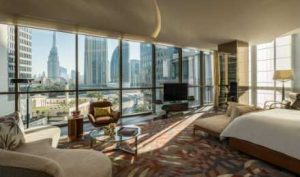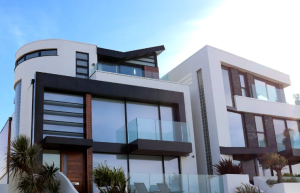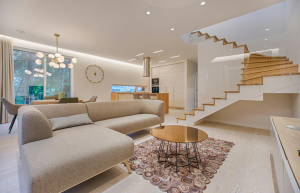Palm Jumeirah, an iconic man-made archipelago in Dubai, is synonymous with luxury living. However, as environmental consciousness grows, many homeowners on the Palm are seeking ways to make their opulent lifestyles more sustainable. Sustainable renovation offers a pathway to reduce the environmental footprint while maintaining the elegance and comfort expected of a Palm Jumeirah villa. This article explores various eco-friendly upgrades that can transform a luxurious home into a beacon of sustainability.
The Importance of Sustainable Renovation
Sustainable renovation is about more than just reducing energy bills; it’s about creating a living space that harmonizes with the environment. In Palm Jumeirah, where villas are often expansive and resource-intensive, sustainable practices can make a significant impact. These upgrades not only help in conserving resources but also enhance the property’s value and contribute to a healthier living environment.
Environmental Impact
The environmental benefits of sustainable renovations are manifold. By reducing energy consumption and utilizing renewable resources, homeowners can significantly decrease their carbon footprint. Water conservation measures and waste reduction further enhance the environmental sustainability of a villa. In a region where the climate can be harsh, these measures are particularly crucial.
Economic Benefits
While the initial investment in sustainable upgrades can be substantial, the long-term savings are considerable. Energy-efficient systems and appliances reduce utility bills, and sustainable materials often have a longer lifespan than their traditional counterparts. Additionally, as the global market shifts towards sustainability, eco-friendly properties are likely to see higher resale values.
Health and Well-being
Sustainable homes often promote better health for their occupants. Improved air quality, natural lighting, and the use of non-toxic materials can enhance overall well-being. In Palm Jumeirah, where outdoor spaces are a key feature of the lifestyle, sustainable landscaping can create a more enjoyable and healthy environment.
Key Areas for Sustainable Renovation
When renovating a Palm Jumeirah villa, there are several key areas to focus on for maximum sustainability. These include energy efficiency, water conservation, material selection, and waste management.
Energy Efficiency
Energy efficiency is at the core of sustainable renovation. Here are some strategies to consider:
Solar Panels
Solar panels are a significant investment but offer long-term benefits. The abundant sunshine in Dubai makes solar power an excellent option for Palm Jumeirah villas. Solar panels can provide a substantial portion of a home’s electricity needs, reducing reliance on the grid and lowering energy bills.
Insulation and Windows
Proper insulation and high-performance windows are essential for maintaining a comfortable indoor climate. Insulating walls, roofs, and floors can prevent heat loss in winter and keep the interior cool in summer. Double-glazed or triple-glazed windows reduce energy loss and improve sound insulation.
Energy-Efficient Appliances
Replacing old appliances with energy-efficient models can significantly reduce energy consumption. Look for appliances with high Energy Star ratings, which indicate superior energy performance. This includes air conditioning units, refrigerators, washing machines, and dishwashers.
Smart Home Systems
Smart home systems can optimize energy use by automatically adjusting lighting, heating, and cooling based on occupancy and time of day. These systems provide convenience and efficiency, ensuring that energy is not wasted.
Water Conservation
Water is a precious resource, especially in arid regions like Dubai. Implementing water conservation measures can make a significant impact.
Low-Flow Fixtures
Installing low-flow faucets, showerheads, and toilets can dramatically reduce water usage without compromising performance. These fixtures are designed to use less water while maintaining pressure and flow.
Greywater Systems
Greywater systems recycle water from showers, sinks, and washing machines for use in irrigation and flushing toilets. This reduces the demand for fresh water and is particularly beneficial in maintaining lush landscaping.
Drip Irrigation
For outdoor areas, drip irrigation systems deliver water directly to the roots of plants, minimizing evaporation and runoff. This method is highly efficient and ensures that plants receive the necessary moisture.
Sustainable Materials
The materials used in renovation play a crucial role in the sustainability of a project. Opt for materials that are renewable, recycled, or have a low environmental impact.
Bamboo and Recycled Wood
Bamboo is a fast-growing, renewable resource that is excellent for flooring and cabinetry. Recycled wood, on the other hand, gives a second life to old materials and reduces the demand for new timber.
Low-VOC Paints
Volatile organic compounds (VOCs) in traditional paints can release harmful chemicals into the air. Low-VOC paints are safer for both the environment and the occupants, improving indoor air quality.
Recycled Glass and Metal
Recycled glass and metal can be used for countertops, tiles, and fixtures. These materials reduce the need for new resources and add a unique aesthetic to the home.
Waste Management
Effective waste management during and after renovation is essential for sustainability.
Construction Waste Recycling
Many of the materials from demolition and renovation can be recycled. Wood, metal, concrete, and even some plastics can be processed and reused, reducing landfill waste.
Composting
For organic waste, composting is an excellent option. Compost bins can turn kitchen scraps and garden waste into nutrient-rich soil, perfect for maintaining a healthy garden.
Sustainable Landscaping
The outdoor spaces of a Palm Jumeirah villa are as important as the interiors. Sustainable landscaping can enhance the beauty of the property while being environmentally friendly.
Native Plants
Using native plants in landscaping reduces the need for water, fertilizers, and pesticides. These plants are adapted to the local climate and soil conditions, making them more resilient and easier to maintain.
Xeriscaping
Xeriscaping is a landscaping method that focuses on drought-tolerant plants and efficient irrigation. This approach minimizes water use and creates a visually appealing garden that thrives in the arid climate.
Green Roofs and Walls
Green roofs and walls are covered with vegetation, providing insulation, reducing the heat island effect, and improving air quality. These features can also create beautiful, serene spaces within the property.
Renewable Energy Solutions
In addition to solar panels, other renewable energy solutions can be integrated into Palm Jumeirah villas.
Solar Water Heaters
Solar water heaters use the sun’s energy to heat water, reducing the need for gas or electric water heaters. These systems are efficient and can provide hot water throughout the year.
Wind Turbines
For properties with enough space, small wind turbines can be an excellent addition. These turbines generate electricity from wind, providing a renewable energy source that complements solar power.
Geothermal Heating and Cooling
Geothermal systems use the earth’s stable temperature to heat and cool homes. These systems are highly efficient and can significantly reduce energy costs.
Sustainable Design Principles
Incorporating sustainable design principles into the renovation process ensures that the villa is not only eco-friendly but also comfortable and aesthetically pleasing.
Passive Solar Design
Passive solar design involves orienting the home and its windows to maximize natural light and heat during the winter while minimizing it during the summer. This reduces the need for artificial lighting and heating/cooling.
Natural Ventilation
Designing the home to take advantage of natural ventilation can reduce the reliance on air conditioning. This includes strategically placed windows, vents, and open spaces that promote airflow.
Green Building Certifications
Obtaining green building certifications, such as LEED or BREEAM, can guide the renovation process and ensure that the villa meets high sustainability standards. These certifications also add value to the property.
Challenges and Solutions
While sustainable renovation offers many benefits, it also comes with challenges that need to be addressed.
Initial Costs
The initial cost of sustainable upgrades can be high. However, government incentives, grants, and subsidies can help offset these expenses. Additionally, the long-term savings in energy and water bills make the investment worthwhile.
Finding Skilled Professionals
Not all contractors are experienced in sustainable building practices. It is crucial to find professionals who are knowledgeable and committed to sustainability. Research, referrals, and checking credentials can help in selecting the right team.
Material Availability
Sustainable materials may not always be readily available. Planning ahead and sourcing materials from reputable suppliers can ensure that the renovation stays on track.
Climate Considerations
The harsh climate of Dubai poses unique challenges. Sustainable solutions must be tailored to withstand extreme heat and occasional sandstorms. Using durable materials and designs that mitigate these effects is essential.
Case Study: Sustainable Renovation of a Palm Jumeirah Villa
To illustrate the potential of sustainable renovation, let’s consider a case study of a Palm Jumeirah villa that underwent an eco-friendly transformation.
Initial Assessment
The villa, originally built in the early 2000s, had high energy consumption due to inefficient HVAC systems, poor insulation, and outdated appliances. The landscaping was water-intensive, relying heavily on non-native plants and traditional irrigation methods.
Renovation Plan
The renovation plan focused on the following key areas:
- Energy Efficiency: Installation of solar panels, high-efficiency HVAC systems, and energy-efficient appliances. Improved insulation and double-glazed windows were also added.
- Water Conservation: Low-flow fixtures, a greywater recycling system, and a drip irrigation system were implemented. The landscaping was redesigned with native and drought-tolerant plants.
- Sustainable Materials: Bamboo flooring, low-VOC paints, and recycled glass countertops were chosen. Construction waste was carefully managed and recycled where possible.
- Renewable Energy: Solar water heaters and a small wind turbine were installed to complement the solar panels.
- Sustainable Design: Passive solar design principles were integrated, maximizing natural light and ventilation.
Results
The renovated villa saw a 50% reduction in energy consumption and a 40% decrease in water usage. The improved air quality and natural lighting enhanced the living environment, while the new landscaping created a beautiful and sustainable outdoor space. The villa received a LEED Gold certification, significantly increasing its market value.
Conclusion
Sustainable renovation is not just a trend; it’s a necessary step towards a greener future. For homeowners in Palm Jumeirah, embracing eco-friendly upgrades can lead to significant environmental, economic, and health benefits. By focusing on energy efficiency, water conservation, sustainable materials, and renewable energy solutions, it’s possible to create luxurious living spaces that are in harmony with the environment.
As the world moves towards sustainability, Palm Jumeirah villas can set an example of how luxury and eco-consciousness can coexist. With thoughtful planning and investment, these iconic homes can become not only symbols of opulence but also of environmental stewardship.



